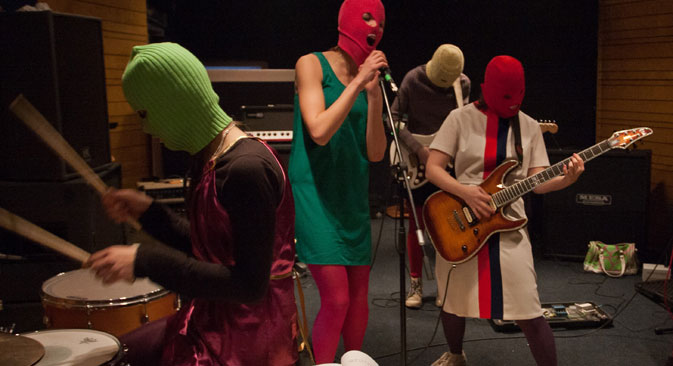
The documentary interviews the Pussy Riot girls’ parents, who are beside themselves with worry. Source: ITAR-TASS
Two documentaries directed by Russian-born Maksim Pozdorovkin, “Pussy Riot: A Punk Prayer” and “The Notorious Mr. Bout,” have been recognized on the global stage for their poignant political statements.
“Pussy Riot: A Punk Prayer,” was proposed this year for an Academy Award, while “The Notorious Mr. Bout,” a film about a Russian arms dealer, was shown at the Sundance Film Festival.
Maxim Pozdorovkin came to New York from Moscow with his family when he was 11. He studied at Cornell University and Harvard University. He was awarded a PhD by Harvard after defending a thesis “Khronika: Soviet Newsreel at the Dawn of the Information Age.” He has taught the history of cinema, and directed several documentaries, including “Capital” (about the new capital of Kazakhstan, built in an empty steppe); “Pussy Riot: A Punk Prayer”; and “The Notorious Mr. Bout.”
“Pussy Riot was misrepresented both in Russia and in the West," Pozdorovkin, a co-director of the film about the Russian punk rock band whose members are now serving jail terms. “In Russia, they were portrayed on television as hooligans who hate religion. In the West, the story was that the band sang an anti-Putin song in Russia’s main cathedral, and got a three-year jail term for that. That is utter nonsense. I wanted to show that things are far more complicated."
The documentary interviews the Pussy Riot girls’ parents, who are beside themselves with worry. It interviews their lawyers, who seem more preoccupied with calling people to the barricades than actually defending their clients. It also shows Christian fundamentalists, who see the whole thing as a plot by the dark forces and seem willing to perform an exorcism on the girls in jail. There is also the ultraliberal support group led by Peter Verzilov, the husband of one of the rockers, Nadezhda Tolokonnikova, who speaks impressively fluent English. The film directors separate the real Pussy Riot story from all the chaff, and it becomes obvious that the punk rock band’s stunt did not actually have any particular message. It only became famous because of the reaction by the government and society. Were it not for the arrests and the scandals over the trial, the Pussy Riot performance in the cathedral would have been forgotten in a few weeks’ time, the film suggests.
The two co-directors have somewhat different views of the film’s main message. Pozdorovkin's British counterpart, Mike Lerner, says the film puts the spotlight on Russian President Vladimir Putin’s regime.
“The situation with Pussy Riot gives a very accurate insight into the nature of the current regime and its abuse of power in Russia. Sadly there are many other examples of how the state has abused the basic human rights of its citizens and how it continues to foment intolerance and discord amongst the Russian people for its own political advantage,” Lerner said.
However, the Russian government is not the only culprit guilty of such charges, he added.
"As a British citizen, I am under no illusions that my own state can all too often be the enemy of freedom and social justice too. That is why the rest of the world has rallied around Pussy Riot as a beacon of truth, as an antidote to intolerance and as champions of social justice.”
Pozdorovkin says his vision of the film's purpose is rather different. "Through our films, we try to deconstruct the media. This is very important to me. I am confident that if we are making a political film, it should be a film about the mass media, because it is the media that shape our reality."
Another film by Pozdorovkin, “The Notorious Mr. Bout,” was co-directed by the American film director Tony Gerber. The film centers on Viktor Bout, the Russian arms dealer who has been sentenced to 25 years in jail in the United States.
Russia selects Bondarchuk’s ‘Stalingrad’ for Oscar
Cinematryoshka: a day on the film set of "Moscow Never Sleeps"
Both films represent a combination of politics and art. In Pozdorovkin's opinion, Pussy Riot, who is seen as a punk rock band in the West, are actually conceptual artists rather than musicians. Bout, surprising as it may be, has some claim to artistry as well. Viktor said that he always wanted to be a documentary film maker; he wanted to make National Geographic-style films. “He has shot some very interesting video footage. In fact, about 80 percent of the footage used in my film was shot by Bout himself. The story of his arrest comes on top of that,” Pozdorovkin said.
“Why did I want to make a film about Pussy Riot? Because everyone was using the situation as a PR opportunity, and I felt that the girls were being used for political purposes,” Pozdorovkin said. “The situation with Viktor Bout was more or less the same. One of the people we interviewed for the film said that it was becoming more and more difficult to say anything about Viktor Bout without it becoming a matter of ideological confrontation between the two countries. Bout is either a villain, or a man who has been framed. And I am not happy that this sector has essentially been privatized, I am not happy with the role played by the state here.”
All rights reserved by Rossiyskaya Gazeta.
Subscribe
to our newsletter!
Get the week's best stories straight to your inbox